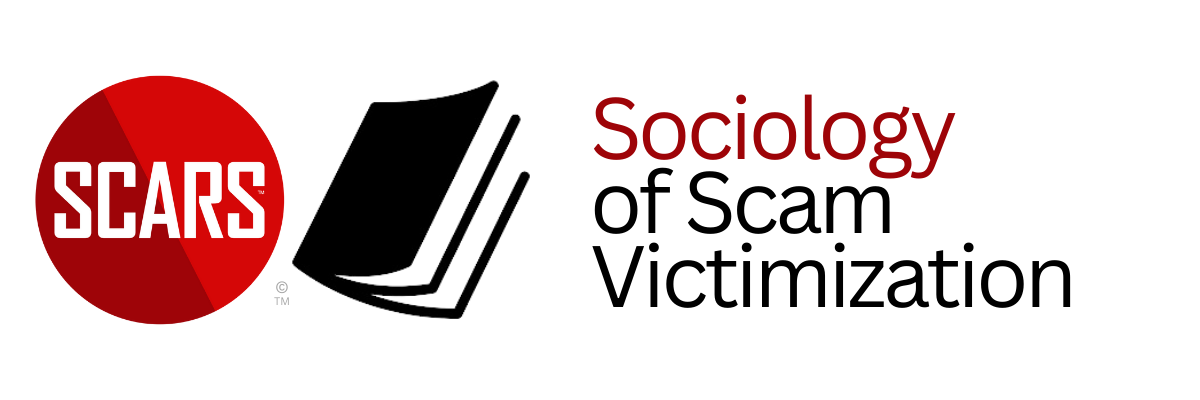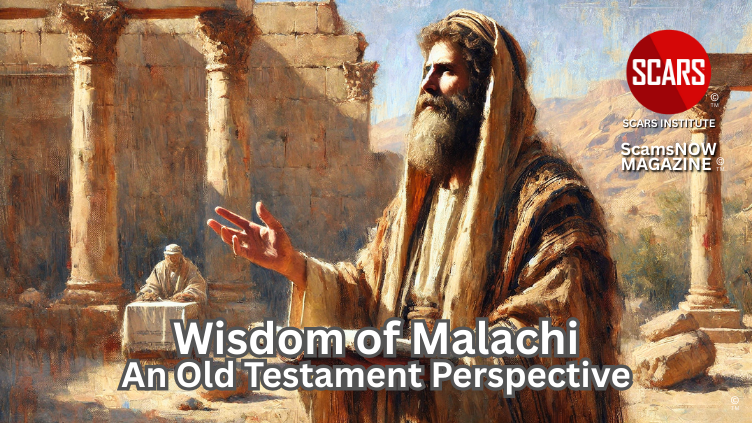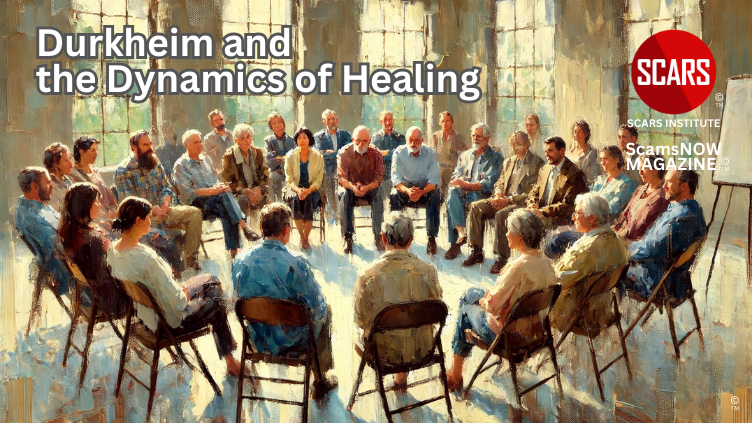Durkheim and the Dynamics of Healing: How Scam Victim Support Groups Build Strength Through Shared Experience
Émile Durkheim and the Strength of Community: How Scam Victims and Advocates Build Cohesion in Support Groups
Primary Category: Sociology
Intended Audience: Scam Victims-Survivors / Family & Friends
Author:
• Tim McGuinness, Ph.D. – Anthropologist, Scientist, Director of the Society of Citizens Against Relationship Scams Inc.
• Based on the work of Émile Durkheim
About This Article
Support groups for scam victims are not simply places where people vent or seek advice—they are intentional communities, grounded in shared experience and emotional solidarity. Using Émile Durkheim’s concept of mechanical solidarity, we can understand these groups as spaces where cohesion arises from common trauma, mutual understanding, and shared values. When you join or help facilitate a scam recovery group, you’re stepping into a system where norms, rituals, and rules do more than maintain order—they create emotional safety.
Durkheim’s sociology reminds us that healing is not just an individual pursuit. It is a collective process, one that depends on structured support, repeated rituals, and the quiet, steady presence of people who have walked the same path. Social norms and rules may seem limiting, but they’re essential to maintaining trust and protecting the group’s emotional integrity. When you follow those rules, you help hold the group together. When you model empathy and accountability, you help others learn how to stay connected. And when you return to the group again and again, despite your own pain, you contribute to a resilient structure that holds space for everyone’s growth. This is what real recovery looks like—not just being supported, but actively co-creating a space where healing is possible.

Émile Durkheim and the Strength of Community: How Scam Victims and Advocates Build Cohesion in Support Groups
Émile Durkheim, a founding figure in sociology, believed that society functions not just through institutions, laws, or economics, but through shared beliefs, collective experiences, and social norms. His concept of mechanical solidarity, a type of social cohesion that binds people together based on similarity and shared purpose, provides a compelling framework for understanding the dynamics of scam victim support groups. In your recovery, or as an advocate helping others through theirs, these principles are not just theoretical—they play out in real time, in every meeting, message, and moment of connection.
Understanding Mechanical Solidarity
Durkheim distinguished between two types of social cohesion: mechanical solidarity and organic solidarity. Mechanical solidarity is typical of smaller, close-knit communities where individuals are bonded by shared values, beliefs, and emotional experiences. Organic solidarity, by contrast, emerges in large, diverse societies where people depend on each other through specialization and interdependence.
Scam victim support groups function with the qualities of mechanical solidarity. Everyone in the group has experienced a form of betrayal and trauma that reshaped their sense of self and safety. That shared emotional history becomes the foundation of connection. You don’t have to explain the pain in detail for others to understand it—they already do. This emotional and experiential alignment creates a unique form of cohesion that is both powerful and fragile. It must be protected through shared norms, clear rules, and active participation.
The Role of Shared Trauma in Group Cohesion
Durkheim would argue that the collective consciousness—the shared set of beliefs and moral attitudes that unify a group—forms the bedrock of social life. In a support group, that consciousness is grounded in mutual understanding of scam trauma. You gather not just to process what happened, but to regain a sense of belonging in a world that may now feel indifferent or unsafe. The group becomes a micro-society, where the norms of the outside world don’t always apply. Here, your pain is valid. Your story is not dismissed. Your voice is heard.
What binds you to others in this environment is not just empathy—it is recognition. When you share your experience, and someone nods with understanding, you are reminded that you are not alone. That recognition is the emotional equivalent of mechanical solidarity. You may be strangers by traditional standards, but in the shared language of betrayal, grief, and recovery, you are kin.
Why Social Norms Matter in Recovery Groups
Social norms are unspoken rules that guide behavior. In support groups, these norms are essential for maintaining safety, trust, and mutual respect. They are not about control—they are about consistency. When you enter a group space, whether online or in person, you need to know what is expected. You need to feel that your vulnerability will be protected, not exploited.
Durkheim believed that norms arise naturally in cohesive communities. They are reinforced through collective behavior and become the invisible framework that holds the group together. In a scam recovery group, norms might include confidentiality, active listening, no victim-blaming, and emotional accountability. These standards allow the group to function without chaos or harm. They create a space where healing can occur without the fear of judgment or betrayal.
Without norms, support groups fall apart. Conversations become unsafe. Participants withdraw or act out. Trust erodes. The solidarity that once provided strength begins to fragment. This is why maintaining group norms is everyone’s responsibility—not just the moderators or advocates. Each person contributes to the tone and safety of the space.
The Value of Rules: Structure as Psychological Safety
While norms are informal, rules are explicit. Every effective support group needs both. Rules are the formalization of the group’s collective agreement on how to treat one another. They protect the vulnerable and set boundaries around harmful behaviors. Rules may dictate how often members must participate, how conflict is handled, or what topics are off-limits.
You may be tempted to see rules as restrictive, especially when you’re already feeling raw or overwhelmed. But in truth, rules are protective. They provide structure. And structure creates safety. When you know what to expect from others—and what they can expect from you—you can begin to relax. You can share without fear of backlash. You can listen without feeling responsible for someone else’s reaction. You can trust the group process because it has a container.
Durkheim would say that rules are an extension of social facts—external, collective forces that shape individual behavior. In the context of support groups, those forces are not punitive. They are therapeutic. They hold the group together when emotions run high. They preserve the integrity of the healing space.
How Advocates Model and Reinforce Cohesion
Advocates play a critical role in support groups, not just as facilitators but as carriers of the group’s moral and emotional tone. Their presence models emotional regulation, compassionate listening, and resilience. They reinforce norms by upholding boundaries. They normalize the ups and downs of recovery without minimizing anyone’s pain.
As an advocate, your consistency becomes a stabilizing force. When you show up regularly, follow the group’s rules, and treat everyone with respect, you are modeling what Durkheim might call moral authority. Not in a hierarchical sense, but as someone who demonstrates what it means to belong. You help others learn how to be part of the group—not through lecture, but through example.
Advocates also act as bridges. They link new members to the group’s values. They support those who struggle to conform to norms without shaming them. They remind members why the rules exist, and what the group stands for. In doing so, they strengthen mechanical solidarity. They turn a collection of hurting individuals into a supportive, interconnected community.
Ritual, Repetition, and the Practice of Cohesion
Durkheim believed that ritual reinforces social bonds. In support groups, rituals may include opening and closing statements, regular meeting times, shared affirmations, or even the simple act of checking in. These repeated actions give the group rhythm and predictability. They mark the space as sacred—a place where healing is prioritized and emotional safety is respected.
You may not think of your weekly Zoom call or in-person meeting as a ritual, but that is exactly what it is. It is a recurring space where trauma is transformed into connection, where fear is met with validation, and where silence is broken by truth. Over time, these rituals help you regulate your nervous system. They signal to your body and mind that you are safe, seen, and supported.
These routines do more than comfort you—they bind the group. Ritual is how the group renews its cohesion week after week. It is how you build trust, not just in others, but in the process itself.
Durkheim and the Modern Recovery Space
While Durkheim wrote in the context of industrializing Europe, his insights remain remarkably relevant to today’s trauma-informed recovery spaces. Online support groups, moderated forums, and structured recovery programs are modern expressions of what he described over a century ago. They are communities organized around shared experience, defined by common norms, and sustained by the collective commitment of their members.
When you participate in a scam recovery support group, you are not just seeking help—you are participating in a form of social repair. You are reweaving your sense of trust in others. You are contributing to a collective consciousness that honors pain while promoting healing. And in doing so, you are not just receiving solidarity—you are creating it.
Conclusion
Durkheim’s sociology offers a powerful lens for understanding how and why scam victim support groups work. His ideas on mechanical solidarity, collective consciousness, social norms, and the importance of shared ritual highlight the essential role of structure and connection in trauma recovery. When you enter a support group, you step into a system of healing that is held together by more than just sympathy. It is bound by shared understanding, mutual respect, and common rules that provide emotional safety.
You do not need to be a sociologist to feel the power of this cohesion. You experience it every time someone says, “I get it,” and you believe them. Every time an advocate holds the group together during a difficult moment. Every time a rule or ritual reminds you that this space is for healing, not harm. The structure is not there to limit you—it is there to support you. Because in a world that once deceived and betrayed you, predictability and consistency are not restrictions. They are reparations.
You heal not in isolation, but in connection. And Durkheim helps us see that connection not as an accident, but as something that can be built, maintained, and protected. Your participation in a support group is not just about what you get—it is also about what you give. And in giving structure, empathy, and presence, you help to create a community where others can do the same. That is not just recovery. That is resilience, practiced together.
-/ 30 /-
What do you think about this?
Please share your thoughts in a comment below!
Statement About Victim Blaming
SCARS Institute articles examine different aspects of the scam victim experience, as well as those who may have been secondary victims. This work focuses on understanding victimization through the science of victimology, including common psychological and behavioral responses. The purpose is to help victims and survivors understand why these crimes occurred, reduce shame and self-blame, strengthen recovery programs and victim opportunities, and lower the risk of future victimization.
At times, these discussions may sound uncomfortable, overwhelming, or may be mistaken for blame. They are not. Scam victims are never blamed. Our goal is to explain the mechanisms of deception and the human responses that scammers exploit, and the processes that occur after the scam ends, so victims can better understand what happened to them and why it felt convincing at the time, and what the path looks like going forward.
Articles that address the psychology, neurology, physiology, and other characteristics of scams and the victim experience recognize that all people share cognitive and emotional traits that can be manipulated under the right conditions. These characteristics are not flaws. They are normal human functions that criminals deliberately exploit. Victims typically have little awareness of these mechanisms while a scam is unfolding and a very limited ability to control them. Awareness often comes only after the harm has occurred.
By explaining these processes, these articles help victims make sense of their experiences, understand common post-scam reactions, and identify ways to protect themselves moving forward. This knowledge supports recovery by replacing confusion and self-blame with clarity, context, and self-compassion.
Additional educational material on these topics is available at ScamPsychology.org – ScamsNOW.com and other SCARS Institute websites.
-/ 30 /-
What do you think about this?
Please share your thoughts in a comment below!
One Comment
Leave A Comment
Important Information for New Scam Victims
- Please visit www.ScamVictimsSupport.org – a SCARS Website for New Scam Victims & Sextortion Victims.
- SCARS Institute now offers its free, safe, and private Scam Survivor’s Support Community at www.SCARScommunity.org – this is not on a social media platform, it is our own safe & secure platform created by the SCARS Institute especially for scam victims & survivors.
- SCARS Institute now offers a free recovery learning program at www.SCARSeducation.org.
- Please visit www.ScamPsychology.org – to more fully understand the psychological concepts involved in scams and scam victim recovery.
If you are looking for local trauma counselors, please visit counseling.AgainstScams.org
If you need to speak with someone now, you can dial 988 or find phone numbers for crisis hotlines all around the world here: www.opencounseling.com/suicide-hotlines
Statement About Victim Blaming
Some of our articles discuss various aspects of victims. This is both about better understanding victims (the science of victimology) and their behaviors and psychology. This helps us to educate victims/survivors about why these crimes happened and not to blame themselves, better develop recovery programs, and help victims avoid scams in the future. At times, this may sound like blaming the victim, but it does not blame scam victims; we are simply explaining the hows and whys of the experience victims have.
These articles, about the Psychology of Scams or Victim Psychology – meaning that all humans have psychological or cognitive characteristics in common that can either be exploited or work against us – help us all to understand the unique challenges victims face before, during, and after scams, fraud, or cybercrimes. These sometimes talk about some of the vulnerabilities the scammers exploit. Victims rarely have control of them or are even aware of them, until something like a scam happens, and then they can learn how their mind works and how to overcome these mechanisms.
Articles like these help victims and others understand these processes and how to help prevent them from being exploited again or to help them recover more easily by understanding their post-scam behaviors. Learn more about the Psychology of Scams at www.ScamPsychology.org
SCARS INSTITUTE RESOURCES:
If You Have Been Victimized By A Scam Or Cybercrime
♦ If you are a victim of scams, go to www.ScamVictimsSupport.org for real knowledge and help
♦ SCARS Institute now offers its free, safe, and private Scam Survivor’s Support Community at www.SCARScommunity.org/register – this is not on a social media platform, it is our own safe & secure platform created by the SCARS Institute especially for scam victims & survivors.
♦ Enroll in SCARS Scam Survivor’s School now at www.SCARSeducation.org
♦ To report criminals, visit https://reporting.AgainstScams.org – we will NEVER give your data to money recovery companies like some do!
♦ Follow us and find our podcasts, webinars, and helpful videos on YouTube: https://www.youtube.com/@RomancescamsNowcom
♦ Learn about the Psychology of Scams at www.ScamPsychology.org
♦ Dig deeper into the reality of scams, fraud, and cybercrime at www.ScamsNOW.com and www.RomanceScamsNOW.com
♦ Scam Survivor’s Stories: www.ScamSurvivorStories.org
♦ For Scam Victim Advocates visit www.ScamVictimsAdvocates.org
♦ See more scammer photos on www.ScammerPhotos.com
You can also find the SCARS Institute’s knowledge and information on Facebook, Instagram, X, LinkedIn, and TruthSocial
Psychology Disclaimer:
All articles about psychology and the human brain on this website are for information & education only
The information provided in this and other SCARS articles are intended for educational and self-help purposes only and should not be construed as a substitute for professional therapy or counseling.
Note about Mindfulness: Mindfulness practices have the potential to create psychological distress for some individuals. Please consult a mental health professional or experienced meditation instructor for guidance should you encounter difficulties.
While any self-help techniques outlined herein may be beneficial for scam victims seeking to recover from their experience and move towards recovery, it is important to consult with a qualified mental health professional before initiating any course of action. Each individual’s experience and needs are unique, and what works for one person may not be suitable for another.
Additionally, any approach may not be appropriate for individuals with certain pre-existing mental health conditions or trauma histories. It is advisable to seek guidance from a licensed therapist or counselor who can provide personalized support, guidance, and treatment tailored to your specific needs.
If you are experiencing significant distress or emotional difficulties related to a scam or other traumatic event, please consult your doctor or mental health provider for appropriate care and support.
Also read our SCARS Institute Statement about Professional Care for Scam Victims – click here
If you are in crisis, feeling desperate, or in despair, please call 988 or your local crisis hotline – international numbers here.
More ScamsNOW.com Articles
A Question of Trust
At the SCARS Institute, we invite you to do your own research on the topics we speak about and publish. Our team investigates the subject being discussed, especially when it comes to understanding the scam victims-survivors’ experience. You can do Google searches, but in many cases, you will have to wade through scientific papers and studies. However, remember that biases and perspectives matter and influence the outcome. Regardless, we encourage you to explore these topics as thoroughly as you can for your own awareness.















![NavyLogo@4x-81[1] Durkheim and the Dynamics of Healing: How Scam Victims' Support Groups Build Strength Through Shared Experience - 2025](https://scamsnow.com/wp-content/uploads/2025/04/NavyLogo@4x-811.png)









![scars-institute[1] Durkheim and the Dynamics of Healing: How Scam Victims' Support Groups Build Strength Through Shared Experience - 2025](https://scamsnow.com/wp-content/uploads/2025/04/scars-institute1.png)

![niprc1.png1_-150×1501-1[1] Durkheim and the Dynamics of Healing: How Scam Victims' Support Groups Build Strength Through Shared Experience - 2025](https://scamsnow.com/wp-content/uploads/2025/04/niprc1.png1_-150x1501-11.webp)
I look forward to our first meeting today. I know I need to feel the sense of community as it will help me come out of my self-inflicted isolation – both mentally and physically.
I appreciate the explanations of why structure and rules are in place: to protect each of us and to provide a safe space to express our trauma and that it’s a space for healing, not harm.